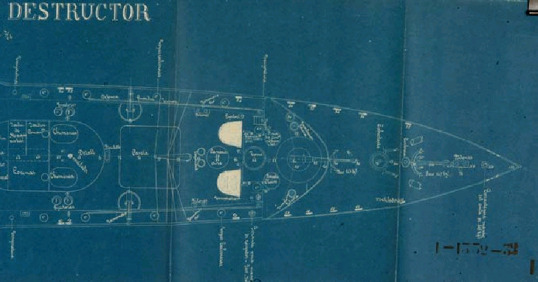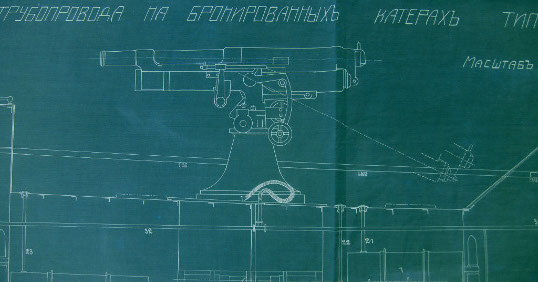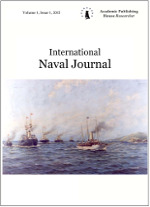1 September 25, 2017
Articles and Statements
1. Sergey A. Stepanenko
The Prams of the Southern Russian Military Fleet of the XVIII century (History of Creation and Military Usage of the «Floating Boxes»)
International Naval Journal, 2017, 5(1): 4-48.
Number of views: 1876 Download in PDF
2. Nicholas W. MitiukovInternational Naval Journal, 2017, 5(1): 4-48.
Abstract:
This particular article examines in close details the history of the Russian military Prams of the Southern Flotillas (The Don flotillas and the Dnepr flotilla) in XVIII century. This paper contains some information such as constructions of these vessels, their service as a part of Flotillas and their role in the Russian-Turkish wars (1735 – 1739 and 1768 – 1774 years), and based on printed authentic sources. In the first part of the article the author focuses on the warfare of the Don flotilla during the second siege and finally the conquest of Azov in 1736; you will find the detailed description of the Pram's participation in fortress's bombardment and the following defense of the fortress against possible attacks of the Turkish Fleet. Also in the article an attention is paid to some information about Prams of the Dniepr (Bryansk) Flotilla which is still little-studied subject. The second part of this article contains description of construction of Prams of the Don Flotilla and their following participation in military defense of Azov town and delta of the River Don against possible Turkish hostile actions. Besides that, the article discusses briefly the questions about differences and features of strategic and tactical usage between Prams of the Baltic Fleet and Prams of the South Flotilla; and also criticized some stereotypes about the role of these kind of vessels in military navy history.
This particular article examines in close details the history of the Russian military Prams of the Southern Flotillas (The Don flotillas and the Dnepr flotilla) in XVIII century. This paper contains some information such as constructions of these vessels, their service as a part of Flotillas and their role in the Russian-Turkish wars (1735 – 1739 and 1768 – 1774 years), and based on printed authentic sources. In the first part of the article the author focuses on the warfare of the Don flotilla during the second siege and finally the conquest of Azov in 1736; you will find the detailed description of the Pram's participation in fortress's bombardment and the following defense of the fortress against possible attacks of the Turkish Fleet. Also in the article an attention is paid to some information about Prams of the Dniepr (Bryansk) Flotilla which is still little-studied subject. The second part of this article contains description of construction of Prams of the Don Flotilla and their following participation in military defense of Azov town and delta of the River Don against possible Turkish hostile actions. Besides that, the article discusses briefly the questions about differences and features of strategic and tactical usage between Prams of the Baltic Fleet and Prams of the South Flotilla; and also criticized some stereotypes about the role of these kind of vessels in military navy history.
Number of views: 1876 Download in PDF
«River Buses» for the Cuban War
International Naval Journal, 2017, 5(1): 49-60.
Number of views: 1810 Download in PDF
3. Curt BorgenstamInternational Naval Journal, 2017, 5(1): 49-60.
Abstract:
In 1895, due to the insurgency that began in Cuba, several private boats were bought in New York for fight against military contraband: four riverboats, three yachts and a tugboat. Based on the data from periodicals, an attempt is made to find a correspondence between American and Spanish names. The reconstruction was verified by matching the American river register and the list of ships and ships of the Spanish fleet.
In 1895, due to the insurgency that began in Cuba, several private boats were bought in New York for fight against military contraband: four riverboats, three yachts and a tugboat. Based on the data from periodicals, an attempt is made to find a correspondence between American and Spanish names. The reconstruction was verified by matching the American river register and the list of ships and ships of the Spanish fleet.
Number of views: 1810 Download in PDF
Swedish Coastal Defense Ship Oscar II
International Naval Journal, 2017, 5(1): 61-69.
Number of views: 1874 Download in PDF
4. Michal KochanInternational Naval Journal, 2017, 5(1): 61-69.
Abstract:
Oscar II served in the Swedish Navy for almost 70 years in various roles – as flagship, unit of the Coastal Fleet, as cadets training ship, and finally as stationary training hulk. With the next generation of armored ships- the Sverige class – a substantial increase in firepower and speed was obtained, These ships carried four 28 cm guns and were powered by steam-turbines developing 20 000 hp. Meanwhile the gap between the Äran-class and the Sverige-class was filled by the solitary Oscar II with honor.
Oscar II served in the Swedish Navy for almost 70 years in various roles – as flagship, unit of the Coastal Fleet, as cadets training ship, and finally as stationary training hulk. With the next generation of armored ships- the Sverige class – a substantial increase in firepower and speed was obtained, These ships carried four 28 cm guns and were powered by steam-turbines developing 20 000 hp. Meanwhile the gap between the Äran-class and the Sverige-class was filled by the solitary Oscar II with honor.
Number of views: 1874 Download in PDF
The Transfer, Repair and Sailing to Poland of its Torpedo-Boats in 1921
International Naval Journal, 2017, 5(1): 70-76.
Number of views: 1720 Download in PDF
5. Alexander F. MitrofanovInternational Naval Journal, 2017, 5(1): 70-76.
Abstract:
The actions of Polish destroyers during the Second World War are widely known, their career in the period between world wars is less well known. On the basis of memoir literature and information from the periodical press, an attempt is made to reconstruct the events that accompanied the transfer, repair and sailing to Poland of six captured destroyers. Three of them, because of their bad technical condition, made the transition to a tow, and three of them under their own power.
The actions of Polish destroyers during the Second World War are widely known, their career in the period between world wars is less well known. On the basis of memoir literature and information from the periodical press, an attempt is made to reconstruct the events that accompanied the transfer, repair and sailing to Poland of six captured destroyers. Three of them, because of their bad technical condition, made the transition to a tow, and three of them under their own power.
Number of views: 1720 Download in PDF
The Peruvian Submarines «Dos de Mayo» («Sierra»)
International Naval Journal, 2017, 5(1): 77-81.
Number of views: 1693 Download in PDF
6. International Naval Journal, 2017, 5(1): 77-81.
Abstract:
In the early 1950-s, to replace obsolete and disabled R-class submarines, the Peruvian Navy ordered a series of submarines in the United States that received the project «Sierra». Two submarines were commissioned in 1954, and two more in 1957. Although the S-class submarines did not have the opportunity to participate in full-fledged combat operations, they had a significant impact on strengthening the combat capabilities of the Peruvian navy. All submarines were withdrawn from the fleet in 1999 and the bottom of them is currently functioning as a museum.
In the early 1950-s, to replace obsolete and disabled R-class submarines, the Peruvian Navy ordered a series of submarines in the United States that received the project «Sierra». Two submarines were commissioned in 1954, and two more in 1957. Although the S-class submarines did not have the opportunity to participate in full-fledged combat operations, they had a significant impact on strengthening the combat capabilities of the Peruvian navy. All submarines were withdrawn from the fleet in 1999 and the bottom of them is currently functioning as a museum.
Number of views: 1693 Download in PDF

















